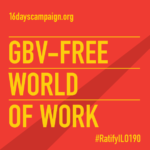Violence against women is recognized as a human rights violation in international law, and as an obstacle to development and economic growth. However, there is a gap in understanding intimate partner violence (IPV) as a serious detriment to women in the world of work and to the world of work overall. With the adoption of the landmark ILO Violence and Harassment Convention (C190) and its corresponding Violence and Harassment Recommendation (R206),there is now an opportunity for governments and employers to address the crucial links between IPV and the harms experienced by women, their co-workers and businesses in the world of work. As noted by C190, it is vital to understand that “domestic violence can affect employment, productivity and health and safety, and that governments, employers’ and workers’ organizations and labour market institutions” have the potential to “help, as part of other measures, to recognize, respond to and address the impacts of domestic violence” and IPV. Considering women’s increased involvement in the workforce, now making up nearly 40% of the global recognized labor force, and estimates by the World Health Organization indicating that about 35% of women worldwide have experienced physical or sexual IPV in their lifetime, the ratification and speedy implementation of ILO C190 and R206 are of utmost importance.
There are many terms used by organizations and individuals when talking about violence against women, sometimes interchangably: domestic violence, which includes family violence, gender-based violence (GBV), battered women, and specifically IPV. While cases of IPV often also fall under these other terms, for this sector highlight, we will use the term intimate partner violence as defined by the World Health Organization to include, “any behaviour within an intimate relationship that causes physical, psychological or sexual harm to those in the relationship. Examples of types of behaviour” include “acts of physical violence, sexual violence, emotional (psychological) abuse,” and “controlling behaviours, including isolating a person from family and friends; monitoring their movements; and restricting access to financial resources, employment, education, or medical care.” Although women can also be violent in relationships in men, and violence sometimes also occurs in same-sex relationships, the perpetrators of IPV are most often current or former male partners, while the victims of IPV are most often women.
Documentation of the effects of IPV perpetrated against women in relation to the world of work is limited, but reports by the World Bank, UN Women, Human Rights Watch, the International Labor Organization, and other organizations demonstrate substantial evidence that IPV significantly affects women’s capacity and opportunity to work, and greatly impairs workplace productivity overall. Feminists and women’s rights organizations have for decades demanded the recognition of domestic violence and IPV as not only private, family issues, but public, political problems as well, United Nations human rights mechanisms have also noted the effects of IPV on the rights of women to work. For example, gender-based violence, even when private and “limited” to the domestic arena, keeps women in subordinated roles and reduces their ability to seek better opportunities or higher paying employment due to ill physical and mental health, absenteeism, and job changes. Being late to work due to physical abuse, taking time off to heal from injuries, living in women’s shelters, faced with stalking or the threat of being murdered are only some of the realities that women suffering from IPV must face, putting a difficult strain on maintaining their jobs. Many women who have experienced GBV, especially IPV, are more often employed in casual and part-time work than women who have not.
In a study in Uganda, 9% of IPV incidents resulted in women taking time from paid work annually, resulting in the loss of half a month’s salary. According to data from the 1995 National Violence Against Women Survey (NVAWS), women in the United States lose an estimated 7,964,248 work days and 32,114 full-time jobs each year because of IPV, resulting in an estimated sot of $8.3 billion in expenses, according to Forbes. Migrant women in Belgium face several obstacles to protection, such as work permits that make them ineligible for protection under provisions for domestic violence victims. Even after separating from their abusive husbands and partners, many women who have faced intimate partner violence find it “extremely difficult to find work immediately after they have left their husbands,” especially as migrants. Reports by Human Rights Watch reports on Russia, Tajikistan, and Papua New Guinea demonstrate the consequences of weak state responses to cases of IPV. In all three cases, the lack of national IPV laws and enforcement of existing laws contributed to the continued physical and emotional abuse of women, difficulties for women to find and retain work, homelessness and loss of child custody, among many other issues.

























